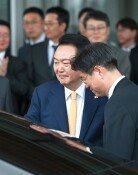S. Korea and US to build value-based alliance
S. Korea and US to build value-based alliance
Posted May. 23, 2022 08:00,
Updated May. 23, 2022 08:00
South Korean President Yoon Suk-yeol and U.S. President Joe Biden ended their four-day schedule with a visit to the Korean Air and Space Operations Center (KAOC) located at Osan Air Base on Sunday. The two leaders have decided to elevate the ROK-U.S. relationship to a ‘global comprehensive strategic alliance’ based on values shared by the two countries, from responses to North Korea to the economy and technology security and global issues. The two will meet again via conference call at a summit meeting of the Indo-Pacific Economic Framework (IPEF) to be launched in Japan on Monday.
The two leaders agreed to expand the geological scope of the ROK-U.S. alliance from the Korean Peninsula to the globe and develop it to be at the center of not only military but also the economy and technology security and global issues. It is a parting from the Moon Jae-in administration’s focus on issues on the Korean Peninsula, such as North Korea’s nuclear weapons, and the Donald Trump administration’s abandonment of leadership in the international community, as well as a fundamental redefinition of the alliance.
In particular, Presidents Yoon and Biden put the core of the alliance on universal values, such as free democracy and human rights. President Yoon mentioned freedom dozens of times in his inaugural speech and President Biden has been calling for the solidarity of democratic countries against authoritarian dictatorship. The two got along well based on similar ideas. President Biden said a vibrant democracy is the driver of global innovations and President Yoon responded by saying that the high-tech industry is impossible without the free democratic system.
The joint statement made by the two contained agendas based on such values. South Korea agreed to join the U.S. in endorsing the Declaration for the Future of the Internet against digital authoritarianism. The country also expressed its willingness to host the Biden-led Summit for Democracy. All of them are the issues that the previous administration had declined to join or been passive due to its relationship with China. South Korean diplomacy, which had been focusing on an awkward balance, made a clear move to the liberal side.
The two countries’ military and security pledges have been further strengthened. The summit meeting took place amid the situation where North Korea has completed preparation to launch intercontinental ballistic missiles and conduct nuclear tests. A plan B of the South Korean and U.S. leaders getting in a united command bunker in case of emergency was put in place. Reflecting such political circumstances, the joint statement included practical measures, such as the reactivation of the Extended Deterrence Strategy and Consultation Group (EDSCG), the expansion of joint drills, and the timely deployment of strategic assets.
The base of an alliance is shared values and interests. A value-based alliance and an interest-based alliance are the two sides of the same coin. In addition, an alliance is a pact to fight together against potential threats. South Korea should address crises, such as supply chain disturbances, by reinforcing channels between South Korea and the U.S., including the newly established the ‘economic security dialogue,’ while demonstrating the diplomatic capabilities based on national interests and pragmatism to build inclusive trade order by actively participating in the IPEF from an early stage.







